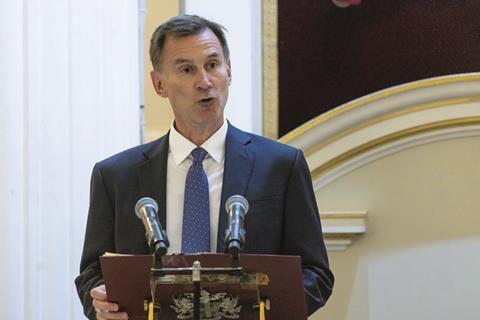The UK’s chancellor of the exchequer, Jeremy Hunt, has delivered his Spring Budget today, which builds on the Mansion House reforms announced last July and the Autumn Statement.
He confirmed that the measures announced over the weekend, which will see defined contribution (DC) pension funds publicly disclose the breakdown of their asset allocations, adding that it will work closely on this with the Financial Conduct Authority (FCA) who share responsibility for setting requirements for the market. The FCA will consult in the spring.
An equivalent requirement will also be introduced for Local Government Pension Scheme (LGPS) funds in England and Wales as early as April 2024.
As part of the Spring Budget, the chancellor also announced the winners of the Long-Term Investment for Technology and Science (LIFTS) initiative, which will award £250m to Schroders and Intermediate Capital Group (ICG).
The government has also confirmed that it remains committed to exploring a lifetime provider model for DC pension schemes in the long term.
It said it will undertake continued analysis and engagement to ensure that this would improve outcomes for pension savers, and build on the foundations of reforms already underway, including the Value for Money Framework.
The work on the Value for Money framework is currently underway with the FCA and The Pensions Regulator (TPR).
Hunt said the framework will highlight where schemes are focusing on short-term cost savings at the expense of long-term investment outcomes, and where schemes’ current scale may be preventing them from offering value to savers.

He warned that where schemes are persistently offering poor outcomes for savers, the FCA and TPR will have the full range of regulatory powers available, and the government expects them to use the powers; these include closing a scheme to new employer entrants and, where necessary, winding up a scheme.
Pot for life pension
The choice of words used in the Spring Budget, according to commentators, suggest that the government is starting to “cool-off” on the idea of a lifetime pensions provider model.
In the Autumn Statement speech, the chancellor talked of consulting on a “legal right” for people to divert their pension savings to a pension provider of their choice. But in the budget paperwork, the government now said it is committed to “exploring” the ideal. It also said that it will only do this if it can “ensure” that this will produce better outcomes.
Steve Webb, partner at LCP, said: “It is welcome to hear the first signs that the government is thinking again about the idea of breaking up the current model of workplace pensions and replacing it with a ‘lifetime provider’ model.
“From a heavily trailed announcement in the Autumn and talk of a new ‘legal right’, today’s Budget simply talks about ‘exploring’ the idea, and needing to be sure first that it would improve things for savers.”
Webb said that it is hoped that this idea will be “quietly dropped” once the full consultation response is out following “overwhelming opposition” from consumer groups and industry experts.

Nigel Peaple, director of policy and advocacy at the Pensions and Lifetime Savings Association, also welcomed the fact the government chose not to introduce the model at this time and instead undertake further analysis to understand the pros and cons of this approach.
“Many steps must be taken, such as the introduction of a Value for Money regime and of measures like Default Consolidators, before it would be possible to introduce a Lifetime Provider model,” he added.
However, some believe the idea should be abandoned all together.
Tim Middleton, director of policy and external affairs at the Pensions Management Institute, said: “We feel frustrated that the chancellor has chosen to press ahead with the Lifetime Provider initiative.
“We noted earlier this year that this was the wrong time for an initiative such as this and are concerned at the disruption this could cause for so much of the good work achieved to date by automatic enrolment.”
David Brooks, head of policy at Broadstone, said the statement came despite widespread industry concern that the reforms “risk undermining some of the recent progress in the sector, confusing members and creating additional, expensive burdens on employers.”
He said: “The government should redouble its efforts to get dashboards live, make DC decumulation pathways the norm and grow contributions – that’s the way to build security and better outcomes for members.”
Jamie Fiveash, chief executive officer of Smart, said the idea is “being rushed out the door” and far greater consideration and consultation with industry is needed to ensure no one is left behind if pot for life is introduced.
“This would represent a seismic change to auto-enrolment and pensions more widely,” he said, adding that while consumer choice is in principle a “good thing”, there is a “real risk” that consumers could be attracted by “savvy consumer marketing” and drawn away from workplace schemes that offer lower costs and strong oversight.
“Genuine consumer choice will only be achieved if the government is able to deliver the other much-needed initiatives it has promised: the expansion of auto-enrolment, increased contributions and the Pensions Dashboard. These are all successful forerunners to a pot for life system,” Fiveash noted.
Not everyone is against the model, however. Phillip Smith, DC director at TPT Retirement Solutions, believes the reforms could be “a game changer” in improving outcomes for DC members.
“The changes could provide members with a better opportunity to understand the benefits accumulated through their DC pension pot. Members would find it easier to engage with their pensions, make investment decisions, and monitor how much they have saved for retirement,” he said.
“In turn, this could encourage people to increase their contributions, so they are better prepared for retirement.”
Read the digital edition of IPE’s latest magazine























